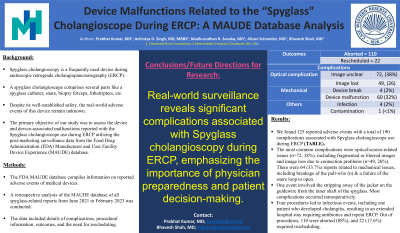Tuesday Poster Session
Category: Interventional Endoscopy
P3691 - Device Malfunctions Related to the “Spyglass” Cholangioscope During ERCP: A MAUDE Database Analysis
Tuesday, October 24, 2023
10:30 AM - 4:00 PM PT
Location: Exhibit Hall

Has Audio
- PK
Prabhat Kumar, MD
Cleveland Clinic Foundation
Cleveland, OH
Presenting Author(s)
Award: Presidential Poster Award
Prabhat Kumar, MD1, Achintya D. Singh, MD, MBBS2, Madhusudhan R.. Sanaka, MD1, Alison Schneider, MD3, Bhavesh Shah, MD2
1Cleveland Clinic Foundation, Cleveland, OH; 2MetroHealth Medical Center, Case Western Reserve University, Cleveland, OH; 3Cleveland Clinic Florida, Weston, FL
Introduction: Spyglass cholangioscopy is a frequently used device during endoscopic retrograde cholangiopancreatography (ERCP). A spyglass cholangioscope comprises several parts like a spyglass catheter, snare, biopsy forceps, lithotripters, etc. Despite its well-established safety, the real-world adverse events of this device remain unknown. The primary objective of our study was to assess the device and device-associated malfunctions reported with the Spyglass cholangioscope use during ERCP utilizing the post-marketing surveillance data from the food drug administration (FDA) Manufacturer and User Facility Device Experience (MAUDE) database.
Methods: The FDA MAUDE database compiles information on reported adverse effects of medical devices. A retrospective analysis of the MAUDE database of all spyglass-related reports from June 2021 to February 2023 was conducted. The data included details of complications, procedural information, outcomes, and the need for rescheduling.
Results: We found 125 reported adverse events with a total of 190 complications associated with Spyglass cholangioscope use during ERCP (TABLE). The most common complications were optical/screen-related issues (n=72, 38%), including fragmented or blurred images and image loss due to connection problems (n=49, 26%). There were 64 (33.7%) reports related to mechanical issues, including breakage of the pull-wire (n) and a failure of the snare loop to open. Other device-related problems included the failure of the spybasket to open (n=5). Additionally, one event involved the stripping away of the jacket on the guidewire from the inner shaft of the spyglass. Most complications occurred intraoperatively. Four procedures led to infectious events, including one patient who developed cholangitis, resulting in an extended hospital stay requiring antibiotics and repeat ERCP. Out of the procedures, 110 were aborted (88%), and 22 (17.6%) required rescheduling.
Discussion: Our study offers valuable insights into uncommon real-world adverse events reported with Spyglass cholangioscopy. Information regarding these complications can aid physician preparedness in managing them and also guide informed decision-making for patients. Future research should assess the actual incidence of these AE and explore methods to mitigate them.
Disclosures:
Prabhat Kumar, MD1, Achintya D. Singh, MD, MBBS2, Madhusudhan R.. Sanaka, MD1, Alison Schneider, MD3, Bhavesh Shah, MD2. P3691 - Device Malfunctions Related to the “Spyglass” Cholangioscope During ERCP: A MAUDE Database Analysis, ACG 2023 Annual Scientific Meeting Abstracts. Vancouver, BC, Canada: American College of Gastroenterology.
Prabhat Kumar, MD1, Achintya D. Singh, MD, MBBS2, Madhusudhan R.. Sanaka, MD1, Alison Schneider, MD3, Bhavesh Shah, MD2
1Cleveland Clinic Foundation, Cleveland, OH; 2MetroHealth Medical Center, Case Western Reserve University, Cleveland, OH; 3Cleveland Clinic Florida, Weston, FL
Introduction: Spyglass cholangioscopy is a frequently used device during endoscopic retrograde cholangiopancreatography (ERCP). A spyglass cholangioscope comprises several parts like a spyglass catheter, snare, biopsy forceps, lithotripters, etc. Despite its well-established safety, the real-world adverse events of this device remain unknown. The primary objective of our study was to assess the device and device-associated malfunctions reported with the Spyglass cholangioscope use during ERCP utilizing the post-marketing surveillance data from the food drug administration (FDA) Manufacturer and User Facility Device Experience (MAUDE) database.
Methods: The FDA MAUDE database compiles information on reported adverse effects of medical devices. A retrospective analysis of the MAUDE database of all spyglass-related reports from June 2021 to February 2023 was conducted. The data included details of complications, procedural information, outcomes, and the need for rescheduling.
Results: We found 125 reported adverse events with a total of 190 complications associated with Spyglass cholangioscope use during ERCP (TABLE). The most common complications were optical/screen-related issues (n=72, 38%), including fragmented or blurred images and image loss due to connection problems (n=49, 26%). There were 64 (33.7%) reports related to mechanical issues, including breakage of the pull-wire (n) and a failure of the snare loop to open. Other device-related problems included the failure of the spybasket to open (n=5). Additionally, one event involved the stripping away of the jacket on the guidewire from the inner shaft of the spyglass. Most complications occurred intraoperatively. Four procedures led to infectious events, including one patient who developed cholangitis, resulting in an extended hospital stay requiring antibiotics and repeat ERCP. Out of the procedures, 110 were aborted (88%), and 22 (17.6%) required rescheduling.
Discussion: Our study offers valuable insights into uncommon real-world adverse events reported with Spyglass cholangioscopy. Information regarding these complications can aid physician preparedness in managing them and also guide informed decision-making for patients. Future research should assess the actual incidence of these AE and explore methods to mitigate them.
Disclosures:
Prabhat Kumar indicated no relevant financial relationships.
Achintya Singh indicated no relevant financial relationships.
Madhusudhan Sanaka indicated no relevant financial relationships.
Alison Schneider indicated no relevant financial relationships.
Bhavesh Shah indicated no relevant financial relationships.
Prabhat Kumar, MD1, Achintya D. Singh, MD, MBBS2, Madhusudhan R.. Sanaka, MD1, Alison Schneider, MD3, Bhavesh Shah, MD2. P3691 - Device Malfunctions Related to the “Spyglass” Cholangioscope During ERCP: A MAUDE Database Analysis, ACG 2023 Annual Scientific Meeting Abstracts. Vancouver, BC, Canada: American College of Gastroenterology.

